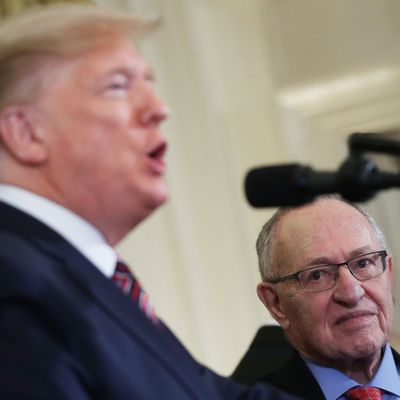
“They’re impeaching me, and there are no crimes. This has to be a first in history,” declared President Trump at a rally this week. The point he appears to be echoing has been advanced in slightly more detailed way by Alan Dershowitz, who may formally join Trump’s team of illustrious legal minds and has laid out his case in op-eds.
The argument is that Trump is being impeached on two counts: abuse of power and obstruction of justice. Neither is a “crime” in the literal sense of violating federal law, nor are they specifically mentioned in the Constitution, which cites “treason, bribery, or other high crimes and misdemeanors” as impeachable offenses.
Obviously, though, the phrase “other high crimes and misdemeanors” is a catchall concept, of which the determination is left to Congress. Dershowitz waves this away by asserting that “other high crimes” is being used to mean “whatever a majority of the House says it is, regardless of what the Constitution mandates. [A] reductionistic and lawless view.” He does not bother to make a case that abuse of power and obstruction of justice are not high crimes. He simply asserts it and concludes, on the basis of this assertion he conjures out of thin air, that the entire impeachment process is “unconstitutional.”
Impeachment is definitely not “unconstitutional.” It’s right there in the Constitution. Whether it’s warranted, and whether Trump’s actions constitute high crimes grave enough to warrant removal, is a matter for debate. Dershowitz tellingly can’t even bother to mount a defense on those grounds.
Trump’s “no crimes” defense places enormous weight on the U.S. criminal code as the sole arbiter of impeachable conduct. “At least [Andrew] Johnson was impeached for violating a specific statute, the Tenure of Office Act, by firing Edwin Stanton as Secretary of War,” sneers the Wall Street Journal editorial page. “There was wide agreement that Richard Nixon and Bill Clinton violated criminal statutes. In this case, Democrats don’t even try to allege a criminal act.”
You want crimes? Oh, there are crimes. One year ago, the Department of Justice convicted Michael Cohen of violating campaign-finance law by giving hush-money payments to women who’d had affairs with Trump, saying he acted “in coordination with and at the direction of” Trump himself. And just this week, the Trump Foundation had to pay a $2 million fine for personal gain — i.e., in common parlance, stealing.
The Mueller report describes a list of acts that would have constituted obstruction of justice — another crime — except that Robert Mueller decided he couldn’t charge the president with a crime or even come out and say Trump’s actions would have been called a crime if he weren’t president.
The problem is there’s a disconnect between the definition of literal crimes and behavior that warrants a president’s removal from office. If Trump were to offer a blanket pardon in advance to anybody who kills a member of the Democratic congressional leadership, that would not be a crime. If he were to knowingly and deliberately understate his income by $1,000 on his federal income-tax form in order to reduce his tax burden, that would. But the former would obviously be much stronger grounds for impeachment than the latter.
Trump’s abuse of power and obstruction of justice may not be his most serious high crimes. That they are the kind of behavior for which impeachment applies, though, seems difficult to dispute. Trump attempted, and nearly succeeded, in getting a foreign country to announce an investigation into his leading opponent — a scheme that, had it not been foiled, would have helped to discredit him, an advantage available to Trump only because he had the power to put American foreign policy at the service of his campaign.
Likewise, he has gone far beyond the normal tug-of-war between the executive and legislative branches by refusing all oversight. Trump’s behavior in the Ukraine scandal may be, and probably is, even worse than we know. It might involve literal violations of the law, in fact. But Congress has no way of knowing because Trump has refused to give it access to witnesses and documents. Even his most obvious abuses of power lie beyond any legitimate investigative role for Congress that he will concede.
The worst behaviors for a president in a democracy are those that turn the powers of the office into political weapons. A central purpose of the Constitution’s design is to prevent a president from turning the office into a monarchy, the powers of which insulate him from political accountability. The U.S. criminal code does not define a lot of behaviors in this category as felonies. The laws are designed for most people, and most people are not president of the United States.






























